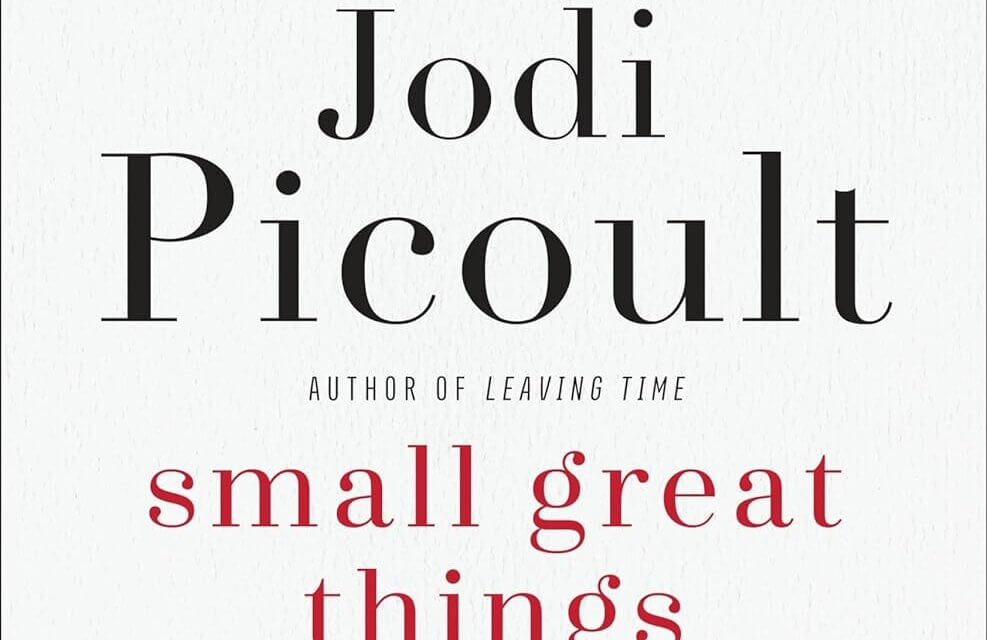Within the pages of Jodi Picoult’s “Great Small Things,” readers embark on an evocative journey that deftly navigates the turbulent waters of race, justice, and the profound impact of seemingly innocuous choices. Picoult’s prose is a rich tapestry woven with intricate threads of emotional depth, moral ambiguity, and astute observations about human nature. In this review, we will explore the compelling narrative, the complex characters, and the broader societal themes that make this novel a poignant exploration of the human condition.
At the heart of “Great Small Things” lies the story of Ruth Jefferson, an African American labor and delivery nurse faced with an unspeakable tragedy. When a white couple, influenced by their own prejudices, forbids her from touching their newborn son, an unfortunate series of events unfolds that culminates in a shocking incident. Ruth becomes embroiled in a legal battle that not only tests her resilience but also forces readers to confront uncomfortable truths about systemic racism and inequality. Picoult employs this framework to present a narrative that, while centered on individual experiences, ultimately casts a wider net, questioning the very fabric of societal norms and values.
The first striking aspect of “Great Small Things” is Picoult’s masterful use of perspective. Each chapter alternates between Ruth, the couple’s attorney, and the father, exposing readers to a multifaceted examination of the characters’ motivations and fears. This technique renders the narrative both complex and accessible, inviting readers to traverse the psychological landscapes of each individual involved in the story. The shifting perspectives act as a prism, refracting the central themes of motherhood, privilege, and the burden of guilt, thus illuminating the dimly lit corners of each character’s soul.
Ruth Jefferson is a character whose strength and vulnerability resonate profoundly. Her experiences encapsulate the struggles faced by many who navigate the choppy waters of racial discrimination and professional ethics. Picoult’s portrayal of Ruth defies the simplistic hero-villain dichotomy often found in literature. Instead, Ruth is a multidimensional figure who grapples with her identity as a Black woman in a profession riddled with bias. Her journey reflects the essence of resilience, as she draws on her inner fortitude to confront both personal and systemic obstacles. The reader cannot help but root for her, as she embodies the indomitable spirit of those who dare to defy entrenched societal barriers.
Moreover, the character of Kennedy McQuarrie, the attorney assigned to defend Ruth, provides a striking contrast. McQuarrie’s own journey unravels as she grapples with her own biases and preconceptions. Her evolution—transitioning from a seemingly neutral party to an active participant in the fight for justice—mirrors the transformative power of empathy. Throughout the novel, Picoult challenges readers to reflect on their own beliefs and assumptions, ultimately positing the idea that understanding and compassion can transcend the most entrenched divides.
Beyond the characters and plot, the narrative is fortified by Picoult’s skillful use of metaphor, which enriches the reading experience and invites readers to contemplate deeper meanings. One can liken the courtroom, a microcosm of society, to a crucible where beliefs are tested and relationships are forged anew, under the relentless flame of truth-seeking. The courtroom scenes themselves are electric, filled with tension and uncertainty, as they reflect the broader struggle for justice and the tension between societal norms and individual rights.
“Great Small Things” also delves into the powerful theme of motherhood—how it is perceived, defined, and often politicized. Throughout the novel, the reader is invited to ponder what it truly means to be a mother. Ruth’s relationship with her son, as well as the desires of the white mother who forbids her touch, encapsulate the multifaceted nature of maternal instincts and societal expectations. Picoult illuminates the fact that love can be both a protective force and a source of vulnerability, drawing readers into an emotional labyrinth where they must confront their own beliefs about love, loyalty, and justice.
The resolution of the story is both simmering and cathartic. It prompts reflection long after the final page is turned. Picoult’s decision to leave the conclusion open-ended allows readers to grapple with the intricate complexities of justice and morality. It serves as a reminder that while the individual story may conclude, the societal conversations it inspires are far from over. In this sense, “Great Small Things” transcends the genre of a mere courtroom drama; it becomes a clarion call for introspection and systemic change.
In conclusion, Jodi Picoult’s “Great Small Things” emerges as a compelling narrative that weaves together the threads of human experience into a thought-provoking tapestry. Through her rich characterizations, intricate metaphor, and exploration of societal issues, Picoult invites readers to engage with uncomfortable truths and question their own roles within the larger framework of societal injustice. This book serves not only as a gripping tale but as a mirror reflecting the intricacies of humanity, leaving its readers both challenged and enriched. With each page, we are reminded that the small things—those seemingly insignificant choices and encounters—can have monumental implications, echoing across generations and societies. “Great Small Things” is indeed a resonant testament to the power of stories in shaping our understanding of the world.
